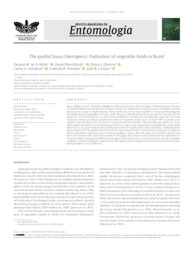The psyllid fauna (Hemiptera: Psylloidea) of vegetable fields in Brazil.
The psyllid fauna (Hemiptera: Psylloidea) of vegetable fields in Brazil.
Autoria: KUHN, T. M. de A.; BURCKHARDT, D.; QUEIROZ, D. L. de; ANTOLÍNEZ, C. A.; TERESANI, G. R.; LOPES, J. R. S.
Resumo: Some psyllids transmit "Candidatus Liberibacter solanacearum" (Lso), the causal agent of devastating plant diseases of cultivated Solanaceae and Apiaceae. The recent detection of Bactericera cockerelli and Lso in Ecuador seriously threatens these crops in South America. There, neither the role of native psyllids in the Lso epidemiology nor the psyllid fauna of vegetables are known. With the aim to identify potential vectors and risk scenarios for the spread of Lso in South America, a survey of the psyllid fauna of Solanaceae and Apiaceae crops and associated weeds was conducted in Brazil. Samples were taken at 29 localities in four states. A total of 2857 specimens were sampled, representing at least 37 species of 23 genera and seven families. The most frequent species on carrot, chilli pepper and potato were Russelliana solanicola, R. capsici and Isogonoceraia divergipennis, respectively. Immatures of R. capsici were found on chilli pepper and of R. solanicola on carrot and potato, confirming these plants as hosts. The two psyllid species have been suspected previously to transmit plant pathogens of unknown identity. Russelliana solanicola is one of the few polyphagous species. Here the species is reported for the first time from carrot. Recent collections in Rio Grande do Sul suggest that Solanum laxum represents the original host of R. capsici, which subsequently shifted to chilli pepper. Both, adaptation to agricultural crops and the possibility of ability to transmit pathogens, make the two Russelliana species dangerous potential vectors of Lso and other plant pathogens in South America.
Ano de publicação: 2023
Tipo de publicação: Artigo de periódico
Unidade: Embrapa Florestas
Palavras-chave: Agricultura, Batata, Capsicum, Carrot, Cenoura, Chilli pepper, Pimenta Chili, Potato, Psilídeo, Psyllidae, Russelliana, Vegetable
Observações
1 - Por padrão são exibidas publicações dos últimos 20 anos. Para encontrar publicações mais antigas, configure o filtro ano de publicação, colocando o ano a partir do qual você deseja encontrar publicações. O filtro está na coluna da esquerda na busca acima.
2 - Para ler algumas publicações da Embrapa (apenas as que estão em formato ePub), é necessário ter, no celular ou computador, um desses softwares gratuitos. Sistemas Android: Google Play Livros; IOS: iBooks; Windows e Linux: software Calibre.
Acesse outras publicações
Acesse a Base de Dados da Pesquisa Agropecuária (BDPA) para consultar o acervo completo das bibliotecas da Embrapa.

